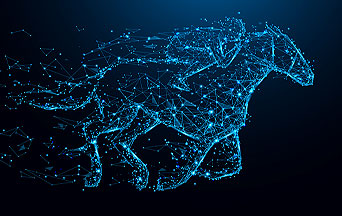
People today live in make-believe worlds. They are conditioned to believe they can be or do whatever they want.
Usually, such fantasies are limited by the real world. However, modern technologies now facilitate the illusions of making believe by creating illusions. The business world is not far behind by providing products that humor people into believing their fantasies can be real. People can then effortlessly indulge in them if they pay the right amount of money.
The latest craze in fantasy-enabling is the Non-Fungible Token (NFT) mania shaking the virtual world. People can claim to own original digital images (often readily available online) by registering their purchases on blockchain platforms. Buyers have nothing to show for their purchase save the original code of historical video moments, gifs and other digital creations. These digital assets often sell for tens of thousands of dollars.
Digital Horse Racing
A new development in this field is the interactive NFT, which consists of virtual assets that seem to have a life of their own. A mania has emerged in the form of digital horse racing.
Eternal and Natural Law: The Foundation of Morals and Law
Yes, digital horse racing. It is a sport that supplies all the thrills of horse racing but with no real horses. Zed Run is a platform where people can buy, sell, breed and race digital horses. The horses are merely lines of code that are made to look like horses on the screen.
They also do not act like horses. These creations do not require food or water. They never tire and can race an unlimited number of times—even on the same day. The creators claim that each horse has its own bloodline and pre-programmed qualities and defects. Zed Run’s digital “stud farm” allows owners to “breed” the digital horses while algorithms make sure each new digital colt is unique.
Racing Is Big Business
The imaginary horses enter Zed Run’s digital racing platform for a modest fee that ranges from free to $100. Races are held every hour, seven days a week and are constantly broadcasted. To give the event the appearance of a race, an algorithm considers the horses’ qualities and past performances. It crunches the numbers to pick one of 10,000 random outcomes to determine a winner. Each 12-horse race has cash prizes for the first three place winners, payable in the cryptocurrency, Ethereum.
Such a platform may seem to be one more playful video game on the Internet. However, people think these races are almost real. They treat their imaginary horse almost like real steeds, giving them names and paying exorbitant prices. Racers engage in the frenetic intemperance of racing at any hour with all the addiction of gambling. Zed Run periodically drops a new crop of horses for eager buyers—at prices rivaling the real thing.
 Learn All About the Prophecies of Our Lady of Good Success About Our Times
Learn All About the Prophecies of Our Lady of Good Success About Our Times
The new sport is big business. Some people are paying prices ranging from $125 to $45,000 for these coded toys. One champion horse recently sold for $125,000. Another “horse” trader sold his whole stable for over $250,000. Some owners expect certain horses will soon sell for $1 million each. Zed Run has sold over $30 million of digital horse flesh to 14,000 stable owners. Virtually Human Studio, the owner of Zed Run, recently raised $20 million to expand the platform.
An Unreal World
The horse enthusiasts form their own eco-system of contacts and society. Legendary horses appear on the tracks as races are live-streamed. Racers get together to follow races results, trade tips and analyze data. Users also live stream races and spread them over social media.
All this excitement is based on fantasy. If Zed Run runs out of steam and cash, the digital horses will revert to nothingness. The NFT stables will fade into cyber-oblivion.
And people will move on to the next craze that promises the greatest excitement.
Sending the Wrong Message
Fads like these send a wrong message to a society in need of a sense of reality and duty. People are taught to enjoy the benefits of owning racehorses but assume none of the effort, risks and sacrifices that come with caring for real animals. Everything is make-believe and has no serious consequences, except to participants’ bank accounts.
Science Confirms: Angels Took the House of Our Lady of Nazareth to Loreto
The problem today is that too many people race digital horses in the figurative sense. They seek empty pleasures and distractions. Instead of building authentic relationships and communities, they prefer to gratify their passions by living in make-believe worlds. They choose to create their own worlds rather than marvel at the created world and, above all, the Creator.
Indeed, there are too many childish toys around in times that clamor for serious adults to confront a world gone awry. Undoubtedly, digital horse racing produces losers.
Photo Credit: © pickup – stock.adobe.com

